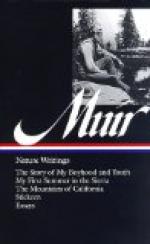Now that I had learned the general direction of the hive, I pushed on in search of it. I had gone perhaps a quarter of a mile when I caught another bee, which, after getting loaded, went through the same performance of circling round and round the honey-box, buzzing in front of me and staring me in the face to be able to recognize me; but as if the adjacent trees and bushes were sufficiently well known, it simply looked around at them and bolted off without much dressing, indicating, I thought, that the distance to the hive was not great. I followed on and very soon discovered it in the bottom log of a corn-field fence, but some lucky fellow had discovered it before me and robbed it. The robbers had chopped a large hole in the log, taken out most of the honey, and left the poor bees late in the fall, when winter was approaching, to make haste to gather all the honey they could from the latest flowers to avoid starvation in the winter.
VII
KNOWLEDGE AND INVENTIONS
Hungry for Knowledge—Borrowing
Books—Paternal
Opposition—Snatched
Moments—Early Rising proves a Way out of
Difficulties—The
Cellar Workshop—Inventions—An
Early-Rising
Machine—Novel Clocks—Hygrometers,
etc.—A Neighbor’s Advice.
I learned arithmetic in Scotland without understanding any of it, though I had the rules by heart. But when I was about fifteen or sixteen years of age, I began to grow hungry for real knowledge, and persuaded father, who was willing enough to have me study provided my farm work was kept up, to buy me a higher arithmetic. Beginning at the beginning, in one summer I easily finished it without assistance, in the short intervals between the end of dinner and the afternoon start for the harvest-and hay-fields, accomplishing more without a teacher in a few scraps of time than in years in school before my mind was ready for such work. Then in succession I took up algebra, geometry, and trigonometry and made some little progress in each, and reviewed grammar. I was fond of reading, but father had brought only a few religious books from Scotland. Fortunately, several of our neighbors had brought a dozen or two of all sorts of books, which I borrowed and read, keeping all of them except the religious ones carefully hidden from father’s eye. Among these were Scott’s novels, which, like all other novels, were strictly forbidden, but devoured with glorious pleasure in secret. Father was easily persuaded to buy Josephus’ “Wars of the Jews,” and D’Aubigne’s “History of the Reformation,” and I tried hard to get him to buy Plutarch’s Lives, which, as I told him, everybody, even religious people, praised as a grand good book; but he would have nothing to do with the old pagan until the graham bread and anti-flesh doctrines came suddenly into our backwoods neighborhood, making a stir something like phrenology and spirit-rappings,




